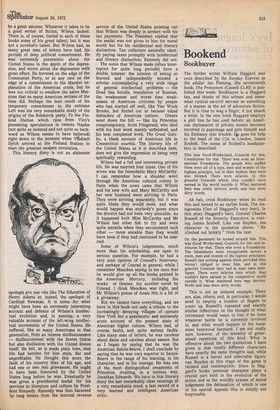Bookend
Bookbuyer
The thriller writer William Haggard was once described by the Sunday Express as the adults' Ian Fleming. His seventeenth book, The Protectors (Cassell £1.80) is published this week. Bookbuyer is a Haggard fan, and thinks of this urbane and somewhat cynical ex-civil servant as something of a master in the art of adventure fiction. But it is time to wag a finger, if not smack a wrist. In the new book Haggard employs a plot line he has used before: an American diplomatist of private means becomes involved in _espionage and gets himself and his Embassy into trouble. lip goes for help to the head of the CIA in London, James Scobell. The scene of Scobell's headquarters is described: This was Good-Works-land, Councils for this, Committees for that. There was even an International Foundation. The people who staffed them were all of a type, men and women of the highest principle, but in their fashion they were also shrewd. There were salaries in this graceful Crescent which they couldn't have earned in the world outside it. What mattered here was solely service: profit and loss were dirty words.
Ah hah, cried Bookbuyer when he read this and turned to an earlier book, The Antagonists (One of Haggard's very best). In this story Haggard's hero, Colonel Charles Russell of the Security Executive, is visiting James Scobell. Like van Ruyden, the character in the quotation above, "He climbed out briskly" from his taxi:
On the pavement he looked around him. This was Good Works-land, Councils for this and Institutes for that. There was even a Foundation. The inhabitants were recognisable across a room, men and women of the highest principles. Russell had nothing against them provided they weren't obliged to meet him, and in this graceful Crescent they had at least been intelligent. There were salaries here which they couldn't have earned in the competitive world outside it. What mattered here was Service Profit and loss were dirty words.
This is not an isolated example. There are, alas, others; and, in particular, I would need to employ a number of fingers to count up Russell's repeated and exactly similar reflections on the thought of what retirement would mean to him if he loses whatever battle he is currently involved in, and what would happen to his handsome bentwood hatstand. I am not really sure, however, of the morality of generalised repetition of this kind. What is offensive about the two quotations I have given is that totally different characters have exactly the same thoughts and, while Russell is a heroic and admirable figure, van Ruyden at this stage of the game is twisted and contemptible. Since in Haggard's books personal character plays a crucial part both in the evolution of the action and in the worldly system of moral judgement the delineation of which is one of his special appeals this is simply not forgiveable.










































 Previous page
Previous page